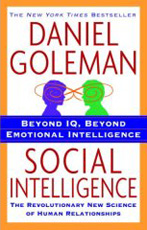Daniel Goleman is the author of the New York Times bestsellers Emotional Intelligence and Working With Emotional Intelligence. He reported on the brain and behavioral sciences for the New York Times for 12 years. In this companion volume to his other works, Goleman reveals that the latest findings in biology and brain science show that we are "wired to connect." Our relationships and daily interactions with parents, spouses, friends, co-workers, bosses, and strangers impact every aspect of our minds and bodies. The "neural ballet" which we dance with others signals how much we are designed for sociability. Good relationships act like vitamins and bad ones, like poison. According to Goleman, we "catch" other people's emotions like we catch a cold and toxic relationships cause us to send out hormones that impact biological systems from the heart to our immune cells.
Goleman covers a wealth of material in this fascinating volume, and it's all good news for spiritual people. We have an affinity for empathy, cooperation, and altruism and can nurture these life-enriching capacities in ourselves and others. Goleman laments what he calls the social corrosion resulting from "technocreep," evident in the increasing isolation of people who wander around in their own private worlds of iPods, Walkmans, and cell phones.
Under the umbrella of the new science of human relationships, Goleman covers such subjects as the social intelligence in infants and spindle cells in the brain; the importance of resilience in children who are able to cope with stress and challenges; the neuroanatomy of a kiss; our capacity for "mindsight"; the dark side of social intelligence (narcissism to psychopathy); the healthy consequences of being a people person; the value in the workplace of socially conscious bosses; the popularity and effectiveness of teachers who show warmth and positive regard for students; and the raw buzz of vitality that ensues from fellow feeling.
One of the most significant chapters is "From Them To Us." It has suggestions for bridging the gulf when empathy is extinguished and altruistic impulses are closed off. Goleman concludes that positive things can happen in a world where the social brain acts as "a built in guidance system for charity, good works, and compassionate acts."
